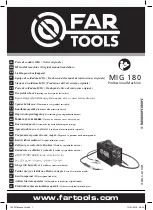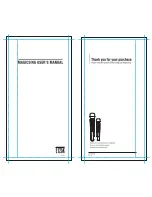
EN
L-L 274.00-BM
• Burner:
• Remove all external dirt and debris
• Make sure the air inlet is not obstructed.
• Pipes, connectors and joints:
• Clean with a cloth.
• External body:
• Clean with a cloth.
• Air inlet/outlet:
• Remove all dirt and debris
• Make sure the air inlet is not obstructed.
6.3 Cleaning the motor and the fan
Clean the fan blades and the motor as follows:
• Remove the fan group fixing screws and then remove the fan
group.
• Clean the motor with compressed air.
• Clean the fan blades with a hard brush.
• Reinstall the fan group.
6.4 CHECKING THE ELECTRICAL CONNECTIONS
After detaching the power cable, check all electrical connections as
follows:
• Make sure that all connections are complete and tight.
• If there are traces of dirt or corrosion, clean or replace the
connections if necessary.
• Replace any damaged wires or connectors if necessary.
6.5 CHECKING AND TESTING THE BURNER
To reach the burner:
• Remove the burner fixing screw.
• Remove the burner and follow the checking and cleaning
instructions in the burner manual.
• Reinstall the burner.
• Run the procedures described in paragraphs 4.7 and 4.8 to
measure combustion parameters and check that combustion is
stable and clean.
6.6 CHECKING THE THERMOSTATS
Inspect the thermostats as follows:
• Remove any air outlet connection ducts
• Find the thermostats fixed to the internal panel of the space
heater.
• Clean with a dry cloth, taking care not to cut or bend the capillary
tube.
6.7 CLEANING THE INTERIOR OF THE HEATER
For thorough cleaning, the heater can be cleaned and washed inside
and outside with water. It is however necessary to ensure that:
• the electrical cable is disconnected and unplugged from the
socket
• completely close all access panels
• do not use water jets at a pressure exceeding 70 bar at a distance
less than 30 cm
• completely dry all parts before reconnecting the electrical cable.
6.8 CLEANING THE COMBUSTION CHAMBER
To maintain the burner’s high efficiency and prolong its life, the
procedure described in this paragraph must be done at least once at
the end of the work season or more frequently if there is an
excessive build-up of soot. Excessive soot may be caused by poor
chimney draught, poor fuel quality, poor regulation of the burner, or
more or less frequent alternation of burner starts and stops.
Pay attention during operation: pulsations at start may be due to
excessive amounts of soot.
To access the heat exchanger (1), take off the rear panel (3), remove
the smoke box inspection panel (2), and then remove baffle plates
(7).
To access the combustion chamber (4) remove the burner (5).
Clean with compressed air or, if necessary, with a metal brush to
remove any deposited soot and combustion residues.
Warning
After any technical work, always check that the heater
works correctly.
7. TROUBLESHOOTING
In the event of serious anomalies, various safety devices are able to
block the machine's operation and signal the same:
• on the electrical panel
the blocking signal following intervention by safety
thermostat L2: the reset button is located inside the burner
box.
(for three-phase models only) the blocking signal following
intervention by the motor thermal protection: the reset
button is located inside the electrical panel.
• on the burner
the blocking signal following intervention by the burner's
flame control box.
Warning
NEVER do more than two restarts in a row: unburned fuel
can accumulate in the combustion chamber and suddenly
flare up at the next restart
.
If the heater is still not working properly, please contact your
nearest dealer or authorized Service Centre.













































